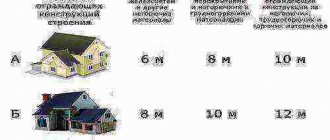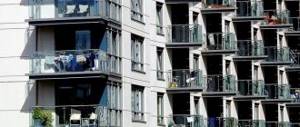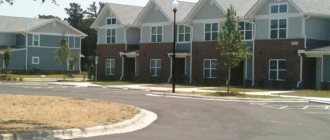Among prosperous buildings, whose residents live in harmony and do not interfere with each other, there are high-rise buildings filled with scandals. In the event that neighbors violate the rules of the hostel, behave aggressively, or do not maintain order, their behavior is unacceptable and the remaining residents have the opportunity to protect their rights. In this case, it is important to know how to file a complaint against neighbors to the district police officer.
Writing a complaint to the district police officer
Procedure for consideration of a complaint by a district police officer
After conversations have been held with the neighbor, the inadmissibility of such behavior has been explained to him, and the conversations have not had the expected effect, more drastic measures can be taken, the first of which is a complaint against the neighbors to the district police officer. In order for the application to be accepted and considered in the manner prescribed by law, the document must be drawn up correctly.
The legislation offers several options for drawing up a complaint and delivering it to a law enforcement agency:
- Written on a piece of paper, submitted to the police office.
- A written appeal is sent to the police address by registered mail.
- An online application is sent to the police website. You must first register and confirm your email address.
Regardless of the chosen method of sending, the application must be written in compliance with the current rules. Must be on behalf of a specific person. Anonymous complaints are considered only if they contain information of national importance: reports of terrorist attacks, murders.
A complaint to the district police officer against neighbors will help in cases where their actions interfere with the lives of other residents, limit their rights or violate the law:
- The neighbors disturb my sleep and make noise at night.
- They violate public order.
- Illegal immigrants live in the house.
- In cases where children are abused.
- Neighbors distribute drugs and sell alcohol.
It is recommended to send the complaint to your place of residence. If it was submitted to the police department at the wrong address, the application will be redirected, which will take a certain period of time and delay the review process.
When is noise acceptable?
Let's start with the fact that silence must be observed at night; during the day, only temporary restrictions apply.
Of course, absolute silence cannot be achieved, so there are approved standards. For example, during the daytime, sound vibrations should not exceed 55 decibels, at night - 45 dB. If the noise exceeds 60 decibels, this is considered an offense and entails administrative liability. For comparison, consider the noise level in various everyday situations:
- Normal conversation - about 45 dB;
- Repair work - on average about 100 decibels;
- A working vacuum cleaner, a scandal, a child crying - about 90 decibels;
- Hammer - 120 dB.
They are regulated at the regional/municipal level: there is no single Federal law on this matter. Therefore, in each region of Russia, daytime and nighttime hours are counted differently. For example:
- Moscow - the night starts at 23:00 and ends at 07:00;
- Krasnoyarsk - from 22:00 to 09:00;
- Primorsky Territory - from 22:00 to 07:00.
To find out what regulations apply in your region, just go to the website of the local administration and familiarize yourself with the relevant regulations. Important! Repair work started during the daytime cannot last more than 6 hours, with a one-hour break provided.
If the neighbors bother you at night
What to do with noisy neighbors? First, you need to try to resolve the situation peacefully and take the path of negotiations. In most cases, this is enough to resolve the conflict situation. If the residents of a troubled apartment have ignored the requests, you can safely contact law enforcement agencies.
Please note that it is necessary to call the police only in cases where residents make noise after the time established by law. The fact of the appeal will be recorded by the duty officer, and a work order will be sent to the specified address. In addition, you can contact the local police officer with a request to influence noisy neighbors.
Ban on noisy neighbors
Let us clarify that noise varies, and loud sounds coming from a neighboring apartment are not always an administrative offense. Let's figure out in what cases you can turn to the police for help so as not to be held accountable for a false call.
Noise unacceptable at night
Unacceptable night noise includes:
- stormy showdowns in raised voices;
- any repair work;
- watching TV and listening to music at maximum volume;
- singing;
- whistling.
The crying of a child or the cough of a neighbor with a cold cannot be considered an offense, even if these sounds to some extent disturb other residents.
Carrying out an examination
In order to bring rowdies and neighbors who do not comply with community standards to justice, it is necessary to confirm the fact that the permissible noise level has been exceeded. Organizations that can conduct the necessary research are the Sanitary and Epidemiological Station and Rospotrebnadzor.
If the fact of an offense is established, the customer will be issued an expert opinion, which can be used as evidence in legal proceedings.
Important! The examination is paid, specialists must be in the apartment directly during the noise.
Evidence base
To bring brawlers to justice, a statement to the police or a lawsuit must be supported by facts proving the offense.
The following will be considered evidence:
- a dictaphone recording where noise is recorded; it is recommended to turn on recording equipment not only in your own apartment, but also in the entrance, as confirmation that the noise is disturbing all residents;
- It would be useful to record the regularity of unacceptable noise, for example, if neighbors are making repairs or loudly sort things out for several days in a row;
- If there are constantly noisy parties in the apartment above, you can take photographs of the whitewash falling off the ceiling or cracks that have appeared.
If neighbors are making noise in the entrance or on the street, recordings from CCTV cameras can be used as evidence if they are installed on the porch or in common areas.
Exceptions to established rules
In some cases, noise at night is allowed, but provided that there are good reasons for this:
- work of emergency teams;
- investigative activities;
- emergencies.
Sometimes even construction and repair work is permissible if it is necessary to ensure the functioning of the facility. However, such work cannot last more than 90 days.
What to do if neighbors continue to make noise despite persuasion
In any case, solving the problem begins with peaceful dialogue. Some neighbors may not be aware that noise restrictions are in effect or may simply not realize that they are causing a nuisance to other residents.
In situations where peaceful conversations end in vain, it is necessary to contact the police. The arriving squad is guaranteed to stop the riots and bring some sense to the restless residents.
How to correctly write a collective complaint against neighbors
A collective complaint against neighbors to a precinct officer is filed in the same way as a single application. The document consists of several parts:
- The position and full name of the district police officer are indicated.
- A list of persons on whose behalf the complaint is being written is listed: address, full name, passport details (preferably).
- The essence of the appeal.
- A list of which articles of the law were violated.
- Date the request was submitted.
- Personal signature of all applicants.
It is good if it is possible to attach photographs, videos and audio recordings to the application confirming the fact of violations.
How to write an application for inadequate tenants renting an apartment: sample
Law-abiding neighbors rarely cause trouble. Residents with inappropriate behavior are a different matter, choosing loud showdowns, fights, scandals and late meetings with friends, preferring alcoholic drinks. In this case, the law protects the peace of its residents, and the actions of violators are subject to punishment, including trial.
The first step in the fight for silence will be to contact the local police officer, who will conduct explanatory work with the culprits. Some tips on how to correctly write a complaint to a local police officer about your neighbors:
- At the top of the application the full name of the district police officer and position are indicated.
- The full name of the applicant must be indicated; anonymous complaints are not allowed to be considered.
- The appeal is signed and dated.
- The letter must be written without emotion or exaggeration, in a technical style, listing the date of the event and the fact of the violation. It is advisable to indicate which norms of the law were violated.
In the complaint, it is recommended not to draw conclusions on your own, not to write assumptions, but only to state the facts and events that the applicant himself witnessed.
In what cases will noise from neighbors be considered a violation of the law?
The following cases are violations of the law regarding excessive noise levels by neighbors:
- loud sounds of music, screams, sounds from construction work and other annoying loud moments during the period of time when the peace of citizens should be ensured - from 23ºº to 7ºº hours (regional authorities have the right to establish other time frames in their territories);
- any sounds exceeding the background noise level set for daytime at 40 decibels, for nighttime at 30 decibels.
It is worth noting that one-time incidents of noisy behavior from neighbors can sometimes be forgiven, understanding that joyful events and parties can happen to everyone. But when it becomes a system and significantly affects the comfort of citizens, it is simply necessary to fight it.
You can start by talking to your noisy neighbors and calling them to their conscience. Although this rarely causes the desired reaction. Usually the only response you can get is screams, threats or indifference. All that remains is to complain so that the competent authorities can take action and calm down the neighbors.
Contacting the police for insult and hooliganism: form
If neighbors behave hostilely, are rude, or use obscene language, the victim has the right to write a complaint to the district police officer. For insult, the perpetrator may be subject to administrative punishment. Hooligan actions, which are expressed in non-compliance with a public nature, threaten the offender with criminal liability.
When drawing up a complaint, the applicant is obliged to indicate only confirmed facts. For assumptions, conjectures and slander regarding another person, you yourself can become accused of false denunciation and slander.
Sample complaint about a neighbor throwing garbage in the wrong place
Clean where there is no litter - this folk wisdom is especially relevant for a multi-storey building. Careless neighbors throw out garbage in all sorts of places that are not intended for this:
- at the entrance;
- from the windows of a car or apartment into the yard;
- They store construction waste in the entrance of the house.
Such actions are subject to punishment, of which the district police officer can be notified with a complaint. The statement must describe in detail the unlawful actions of the neighbor, indicate the name of the offender and the address of residence. Evidence can be photographs, video and audio files, testimony of witnesses.
Is it possible to close a cafe in a residential building? Arbitrage practice
Russian judicial practice knows quite a lot of similar cases. Here are examples of going to court with complaints about noise from cafes and shops:
- The Rospotrebnadzor office filed a lawsuit against the administration of one of the city restaurants demanding an end to illegal actions. The reason was the holding of entertainment events (karaoke) in the establishment from 23-00 to 5-00. The defendant did not agree with the arguments, since the expert opinion showed that the noise level was within normal limits. But the court sided with the plaintiff, since according to clause 4.2 of SanPiN 42-128-4396-7, the work of musical accompaniment in cafes, restaurants, and dance floors must end at 23-00. Particularly stringent requirements are imposed on facilities located in high-rise buildings.
- Plaintiff N. filed a claim against the management of the flower shop located on the floor below. In the statement of claim, the woman indicated that there were ventilation units inside the outlet that emitted vibrations and loud noise. The judge agreed with N.'s arguments, since the defendant violated her right to silence and rest at night. As a result, a decision was made to close the store for a period from 23-00 to 07-00 until the violations were eliminated. In addition, the plaintiff was compensated for moral damages in the amount of 5,000 rubles.
Constant noise from service enterprises can seriously complicate life. Loud decibels spoil your mood and can even harm your health. Therefore, you should not tolerate violations. You need to complain about troublesome neighbors, and through the court you can seek compensation for moral damage.
Still have questions? Ask our lawyers and get a guaranteed qualified answer!
Powers of police officers
A police officer is empowered to resolve issues and bring to justice those responsible in the following cases:
- Smoking and drinking alcoholic beverages in public places.
- Living in a house for undocumented persons.
- Hooliganism.
- Growing or untimely carrying out work to destroy plants of the narcotic group.
- Driving a vehicle without documents, learning to drive a car without having a legal right to do so.
- Using vehicles without license plates or difficult to distinguish license plates.
- Failure to comply with restrictive measures by those citizens under supervision.
You can turn to the local police officer for help in other cases. Even if he cannot resolve the issue, his responsibilities include drawing up a protocol on the violation, which will subsequently be evidence in court or for the guardianship authorities. It will help hold parents accountable for negligent performance of their duties.
The district police officer can independently issue a fine and punish a neighbor who smokes in the entrance. If the tenant makes noise at night and interferes with sleep, a police representative draws up a report and sends it to the administrative commission.
Did your neighbors flood? How to sue and get money?
If your neighbors flooded you and you cannot resolve the issue of compensation for damage peacefully, then it’s time to go to court. However, winning the case is only the beginning, because... this, oddly enough, does not mean that your neighbor will pay you the awarded amount. So how can you not only win the case, but get what you actually started this whole mess for?
First, let's outline a specific situation so that there is something to talk about. So, your upstairs neighbor flooded you. You know about it, he knows about it, but he refuses to pay you for the damage caused or delays this matter under any pretext. First of all, it’s worth understanding that going to court is a rather troublesome task that will require you to spend some money , which is not a guarantee that you will get it back, so think again and try to come to an amicable agreement with the offender.
How to sue for money for a flood?
Now let's talk about the trial itself. Many people have a rather vague idea of how it works. They think that if they are right, then everything is in the bag. In some ideal state, perhaps this is so. In fact, you will need to prove
that it was your neighbor who flooded your apartment (and don’t forget that even if you prove it, it’s not a fact that he will give you the money, but more on that later). If your neighbor declares in court that he knows nothing about this and is seeing you for the first time, then it will be up to you to prove that he is lying. By the way, you can hire a lawyer, but in this case the amount of your financial expenses will increase even more. Also, do not think that anyone will understand the intricacies and details of your business. The judge, in a sense, is an ordinary person who has a lot of cases like yours and he simply cannot thoroughly delve into each one. Ultimately, the one who provides the court with more evidence from his side (papers) will win.
So, first you need to collect these same pieces of paper. Firstly, you need a certificate stating that the flooding actually took place. It is usually called the “Act of the management company on inspection of the apartment.” After flooding, you need to contact the management company of your home (or HOA) and ask them to send a commission to certify this fact. Actually, this paper will be evidence of what happened. Typically, the survey takes place a few days after the flooding, when everything has already dried, so that traces of the final damage can be seen. And in a few more days you should have an Act prepared. It should reflect all traces of water exposure to your property, for example: stains on the ceiling with a total area of 1 sq.m., peeling wallpaper in a large room with an area of 4 sq.m., swelling of parquet flooring, etc. In addition, the Certificate must indicate the reason
of the incident and the guilty party. The fact is that the culprit may not be a neighbor at all, but the management (or operating) company itself, if, for example, a pipe ruptures before the shut-off valve. Also check that the act correctly indicates the date of the flood, the date of inspection, the addresses of your apartment and your neighbor’s apartment, and that there are all the necessary signatures from the commission and seal. Usually such an Act is done free of charge.
After this, you need to assess the damage. Of course, you yourself know perfectly well how much this flood cost you, but this will not work in court. You need a piece of paper from an expert. Contact an expert to assess the damage; these are private companies that do this; if you search, you will find several of these in your city. Make sure the company has the necessary licenses to carry out such work. Ask to see samples of the damage assessment certificates they will give you. Some companies make such certificates on several pages and charge a little money for it. Others take the issue more seriously and, as a result, will give you a whole bound book with color photographs of your stains on the ceiling, peeling wallpaper, tables, calculations, etc. But the price will also be higher. In principle, if you have all the necessary licenses, it doesn’t matter which one you contact. If this calculation does not seem convincing enough in court, then a second forensic examination may be ordered, but no
at your expense. The amount indicated in this expert calculation will be the starting point for calculating the total damage for which you are claiming compensation. Save all documents regarding payment for expert services! Without them, the court will not reimburse you for these expenses!
In order for everything to be in accordance with the law, you must warn your neighbor about the upcoming examination. The point is that he can attend it if he so desires. You have no right to interfere with him, or he will say so in court and your expert assessment will be considered overestimated and not trustworthy. Therefore, you must warn him about this in writing! If you can do this in person, then you need to give him a paper stating that at a certain
at a time and in
a certain
place (in your apartment, apparently) an expert inspection will take place and that he is invited to it.
The neighbor must not only take this piece of paper from you, he must sign on it that he is really familiar with it. In court, this will be proof that you really invited him to the inspection and he confirms this with his signature. If you cannot do this in person, then you need to send him a telegram with a notification
, approximately the following content: “Please send your representative to a joint inspection of the apartment at the address such and such, address such and such, which will take place at 14.00 on October 6, 2013 .as part of an independent examination. If your representative fails to appear, the inspection will be carried out without your participation.” (Instead, the neighbor can send a so-called representative or lawyer). Naturally, you need to keep the receipt for payment for this telegram, a copy of the telegram itself and the delivery receipt, which will be given to you later, or it will be sent to you at your address. If a neighbor came for an inspection, then ask him to sign the document that the expert draws up - have him write that there were no comments during the inspection, or if there are, let him also write them. If he refuses to sign the protocol, ask the expert to record this, for example: “Ivanov N.N. was present at the inspection, but refused to sign the protocol.”
After all this, having received the expert opinion in hand (and being upset at such a small amount that was calculated for you), it’s time to make a copy of this document and also hand it over to your neighbor against signature and try to resolve the issue peacefully.
If it didn’t work, then we continue... Now you should think about how you will prove that it is your neighbor who is responsible to you... The fact is that he can simply live in this apartment, but in fact, someone is its owner the other is his mother, for example, or some other person. To be 100% sure of this and prove it in court (if necessary), be prepared to contact the “Unified State Register of Rights to Real Estate and Transactions with It.” Find this organization in your city and take an extract from this registry for your neighbor’s apartment. It will, among other things, indicate who exactly is the owner of this apartment. Yes, yes, that’s right, you can take an extract from your neighbor’s apartment, even if you yourself have nothing to do with it! You can take such an extract for absolutely any property, this pleasure costs only 200 rubles! (it’s interesting in this case that 152 Federal Law “On Personal Data” is simply ignored?) It is the homeowner who needs to be sued.
So, you have all the necessary evidence, it's time to file a lawsuit! In the claim, you must substantiate in “ordinary language” your claims against your neighbor, refer to certain articles of the law under which you consider it possible to present them, provide a list of necessary evidence on your part, mention the steps that you have taken to resolve this pre-trial (peacefully) question, as well as put forward your demands and provide their calculation.
Below I will give an example of such a statement (all coincidences are random).
Oktyabrsky District Court, Krasnodarsk st. Belokonnaya, no. 178, Krasnodarsk, 154477. Plaintiff: Malygina Larisa Semenovna St. Lomonosova, 7-115, Krasnodarsk, 154400. Defendant: Prokopenko Nina Grigorievna St. Lomonosova, 7-119, Krasnodarsk, 154400. July 10, 2013 Claim price: 58,787.32 rubles State duty: 1963.62 rubles
Statement of claim
on recovery of property damage
In May 2013, apartment No. 115 in building No. 7 on Lomonosova Street in the city of Krasnodar, whose owner is L.S. Malygina, was flooded with water. (hereinafter referred to as the plaintiff). This fact was established by the inspection report of the above apartment dated 05/05/2013, drawn up by a commission created by the manager.
The flooding was due to the fault of N.G. Prokopenko. (hereinafter referred to as the defendant), who is the owner of the apartment located on the floor above (source of flooding).
The plaintiff's attempts to resolve the issue of voluntary compensation for damage were unsuccessful. The defendant also did not come to the appraiser’s inspection of the apartment (which he was notified about by telegram).
In accordance with paragraph 1. Art. 1064 of the Civil Code of the Russian Federation, damage caused to a citizen’s property is compensated in full by the causer of the harm.
From pp. 1 and 2 tbsp. 1064 of the Civil Code of the Russian Federation it follows that in order for the right to compensation for losses arising from tortious obligations to arise, the plaintiff is obliged to prove the totality of such circumstances as: the occurrence of harm; illegality of the behavior of the harm-doer; the presence of a cause-and-effect relationship between the occurrence of harm and the unlawful behavior of the harm-doer.
In paragraph 10 of the Resolution of the Plenum of the Supreme Arbitration Court of the Russian Federation No. 6 of the Plenum of the Supreme Arbitration Court of the Russian Federation No. 8 dated 01.07.1996 “On some issues related to the application of part one of the Civil Code of the Russian Federation” it is noted that when resolving disputes related to compensation for losses caused to citizens and legal persons with a violation of their rights, it is necessary to keep in mind that the actual damage includes not only the expenses actually incurred by the relevant person, but also the expenses that this person will have to make to restore the violated right (Clause 2 of Article 15 of the Civil Code of the Russian Federation). The need for such expenses and their estimated amount must be confirmed by a reasonable calculation, evidence, which can be an estimate (calculation) of the costs of eliminating deficiencies in goods, works, services; an agreement defining the amount of liability for violation of obligations, etc.
The cost of restoration of the plaintiff’s apartment is confirmed by the expert report of the appraiser No. 366 dated June 14, 2013 and amounts to 45,490.00 rubles.
According to Art. 210 Civil Code of the Russian Federation, Art. 30 of the Housing Code of the Russian Federation, the owner of a residential premises bears the burden of maintaining this premises, unless otherwise provided by federal law or an agreement. And according to Part 4 of Art. 30 of the Housing Code of the Russian Federation, the owner of a residential premises is obliged to maintain this premises in proper condition, preventing mismanagement of it, to comply with the rights and legitimate interests of neighbors, the rules for the use of residential premises, as well as the rules for maintaining the common property of the owners of premises in an apartment building.
In fact, establishing the fact that residential premises are owned and flooded by someone else’s residential premises, according to the plaintiff, is a sufficient basis for confirming illegal behavior, i.e. failure to fulfill the obligation imposed by law for the proper maintenance of cold and hot water supply systems located inside the apartment and not related to the common property of the apartment building.
Prokopenko N.G. is the owner of the apartment, as confirmed by an extract from the Unified State Register of Rights to Real Estate and Transactions with It dated May 29, 2013 No. 01/037/2013-237, and, accordingly, is the proper defendant in the case.
Considering that the amount of restoration repairs was not paid by the defendant voluntarily, the plaintiff considers it possible to make a claim for the recovery of interest calculated according to the rules of Art. 395 of the Civil Code of the Russian Federation: (cost of restoration repairs) * (1/360) * (refinancing rate of the Central Bank of the Russian Federation on the day the claim was filed) * (number of days of delay, starting from the day the flooding report was drawn up (05/05/2013) to the day the claim was filed (07/06) .2013)) = (amount of interest): 45490.00 * 1/360 * 0.08 * 65 = 657.08 rub.
In addition, the plaintiff believes it is possible to recover from the defendant the costs incurred in connection with filing this claim (based on Article 15 of the Civil Code of the Russian Federation): a fee for obtaining information from the register in the amount of 200.00 rubles (+ banking services 20.00 rubles), payment for a telegram to notify the defendant of a damage assessment in the amount of 420.24 rubles, payment under the contract for an assessment of the cost of restoration repairs in the amount of 5,000.00 rubles.
I also ask to recover from the defendant compensation for moral damages in the amount of 7,000.00 rubles caused by the inconvenience of turning off the water supply riser for 10 days, the spoiled mood during the May holidays, and the time spent resolving this issue.
Taking into account the above, guided by Art. Art. 3, 23 Code of Civil Procedure of the Russian Federation, I ask the court:
- Collect from Prokopenko N.G. in favor of Malygina L.S. cost of restoration of apartment No. 115 in building No. 7 on the street. Lomonosov in the city of Kranodar in the amount of 45,490.00 rubles.
- Collect from Prokopenko N.G. in favor of Malygina L.S. 657.08 rubles interest for the period from 05/05/2013 to 07/06/2013.
- Collect from Prokopenko N.G. in favor of Malygina L.S. 5640.24 rubles of losses.
- Collect from Prokopenko N.G. in favor of Malygina L.S. 7000.00 rubles compensation for moral damage.
Applications:
- Receipt for payment of state duty dated July 9, 2013 in the amount of 1963.62 rubles.
- Copies of this statement of claim and documents to be sent to the party in the case.
- A copy of the telegram with notification of delivery + receipt of payment.
- Appraiser's report on determining the market value of restoration repairs + contract + two payment receipts.
- Report from the management company on inspection of the apartment.
- Extract from the Unified State Register of Rights to Real Estate and Transactions with It + check for payment of state duty.
- Certificate of state registration of title confirming the plaintiff’s ownership.
Plaintiff ____________Malygina L.S.
I will not describe how to calculate the amount of state duty and choose the right court; look for this information on the websites of courts in your city.
Please note that, in addition to the material damage itself, we ask the court to recover moral damages of 7,000 rubles, the amount of damages, i.e. money spent on obtaining various certificates and so on for this trial, etc. "interest". Since a lot of time can pass from the moment of assessment to the moment of filing a lawsuit, and money tends to depreciate, you have every right to demand “compensation for inflation” under the law. Moreover, if the trial lasts, say, a year, then at each meeting you can clarify your claims, giving a new calculation for the current dates.
You shouldn’t include too large amounts of moral damage; practice shows that you won’t be awarded it anyway. In my opinion, it’s better to write a moderate amount, in this case there’s a greater chance that the judge will agree with your arguments and you won’t look like him. eyes as a person who decided to take advantage of this event (do not forget that the judge is also a person and may or may not feel sympathy for you!).
Next you need to make 1-2 sets of copies of all
documents for the court (if you spend money on this, you can also include this amount in losses). It is better to check with the court exactly how many copies are needed. Usually one copy for the defendant and one for the court; the original documents remain with you; they may only be required in court for review.
Let me remind you once again that the judge is, in a sense, an ordinary person. The outcome of the court hearing may also depend on whether he “likes” you or not (although it shouldn’t). Therefore, behave normally there, do not make trouble, rely on evidence and facts.
The defendant in court may declare that he does not agree with the amount indicated in the claim, saying that there is an expert assessment, but he believes that, for example, it is too high. It's his right. In this case, there are two options:
- A repeat forensic examination is ordered at the expense of the defendant ( not
yours!), in this case,
the court
(not the defendant!) appoints another expert organization that conducts a repeat inspection of your apartment (if repairs have not yet been made there), after which it issues an invoice to the defendant ( as a rule, it is 1.5-2 times the market value), the court accepts a new amount of damage assessment for consideration of the case, and the amount can be either less or more than the original! The only downside is that the case will drag on for at least a month, and the new amount may be less. - You made him sign the expert’s inspection report, right? If it says that there are no comments on his part, then you can protest about the appointment of a re-examination, because no comments
.
Most likely, the court will ask you to end the case with a settlement agreement. This is where, oddly enough, danger awaits you. The essence of the settlement agreement, in a nutshell, is this: you reduce the amount of the original claim, and the defendant promises to pay this money to you voluntarily. “Where’s the catch?” - you ask. The catch is that he promises
, but does not guarantee.
If the court decides (without a settlement agreement) to recover from it the entire amount of the claim in your favor (if the claim is justified and proven), then it will make a court decision on this. If the defendant does not pay
, the court decision will be handed over to the bailiffs so that they can seize his property, etc.
If you signed a settlement agreement, but the defendant does not pay
under it, then you transfer the court order to the same bailiffs and find yourself in the same situation, with the only difference being that the defendant does not owe you the entire amount of the claim, but a smaller amount - the amount for which you agreed in the settlement agreement. Therefore, I recommend signing a settlement agreement only when you are sure that you will actually be paid money under it, without involving bailiffs. If you think that the defendant may not care about this settlement agreement, then you should not enter into it, in this case the bailiffs will demand payment from him for the full amount of the claim. Also, in case of doubt, you can enter into a settlement agreement on the condition that the required amount is transferred directly in the courtroom, without delay.
Actually, this is the difference - winning a case in court does not mean getting money.
One more thing you need to understand is that it is more profitable for the court for you to enter into a settlement agreement, because... For the court it is much simpler - less paperwork, etc. Therefore, the judge can, in a sense, “put pressure” on both one side and the other. Here you need to skillfully defend the position you need. If the defendant actively resists the settlement agreement and does not admit his guilt at all, then we can say that you are ready to agree to the settlement in order to show the court that you are a normal person and are ready to conduct a constructive dialogue. If the opposite happens, then you may refuse to go to settlement due to the fact that you have previously offered the defendant to settle this issue out of court and do not see the point of resolving a case that has already been brought to court amicably (especially since you must reduce the amount of the claim).
On the other hand, in order to understand what would be better - a settlement or not, you also need to understand that, for example, by giving up 20 thousand “according to the settlement” instead of 60 thousand “according to the court”, you may get practically nothing at all, i.e. .To. It turns out that the apartment is registered in the name of the grandmother of a disabled pensioner, with a pension of 6,000 rubles, from which the bailiffs will deduct 200 rubles monthly into your account.
In general, it’s better to live peacefully and don’t go to court









